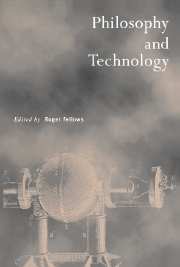Book contents
- Frontmatter
- Contents
- Introduction
- Technology: Liberation or Enslavement?
- Do the Successes of Technology Evidence the Truth of Theories
- Instrument and Reality: The Case of Terrestrial Magnetism and the Northern Lights (Aurora Borealis)
- Realism and Progress: Why Scientists should be Realists
- Quantum Technology: Where to Look for the Quantum Measurement Problem
- Welcome to Wales: Searle on the Computational Theory of Mind
- Acts, Omissions and Keeping Patients Alive in a Persistent Vegetative State
- Technology and Culture in a Developing Country
- Art and Technology: An Old Tension
- Tools, Machines and Marvels
- Values, Means and Ends
- Question Time
- Notes on Contributors
- Index of Names
Question Time
Published online by Cambridge University Press: 27 October 2009
- Frontmatter
- Contents
- Introduction
- Technology: Liberation or Enslavement?
- Do the Successes of Technology Evidence the Truth of Theories
- Instrument and Reality: The Case of Terrestrial Magnetism and the Northern Lights (Aurora Borealis)
- Realism and Progress: Why Scientists should be Realists
- Quantum Technology: Where to Look for the Quantum Measurement Problem
- Welcome to Wales: Searle on the Computational Theory of Mind
- Acts, Omissions and Keeping Patients Alive in a Persistent Vegetative State
- Technology and Culture in a Developing Country
- Art and Technology: An Old Tension
- Tools, Machines and Marvels
- Values, Means and Ends
- Question Time
- Notes on Contributors
- Index of Names
Summary
It makes straightforward sense to ask a person ‘Why did you decide to become a solicitor?’ (or a carpenter, shopkeeper, teacher or professional musician). There is no mystery about the question ‘Why did you decide to become a British citizen?’ (or a member of the Liberal Party, the Roman Catholic Church or the Aristotelian Society). It may be difficult to answer any of these questions. We may not remember, or may be unable to articulate, what first led us to seek ordination, join the Army or stand for Parliament; but the questions themselves are clear, and they ask for fair comment on matters of public or private interest. There are other questions that sound like these but raise difficulties of another order.
‘What made you decide to become a woman?’ This question can be intelligibly asked only of a woman. It cannot be asked of any woman, or of many women. For it can be asked only of a woman who has decided to become a woman. But has there ever been a woman who has become a woman by her own decision? What the newspapers call a sex-change is understood by the new woman as the revelation and acknowledgement and confirmation of a womanhood that was there from birth, unrecognized or disguised and disfigured by shame or shock.
‘What made you decide to become an Englishman?’ This question could be sensibly addressed only to a man who had decided to become an Englishman, and there is no such animal.
- Type
- Chapter
- Information
- Philosophy and Technology , pp. 189 - 201Publisher: Cambridge University PressPrint publication year: 1995



